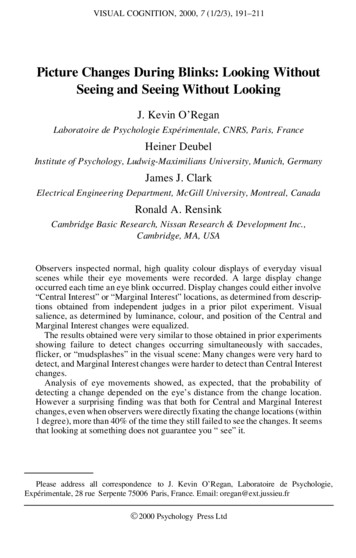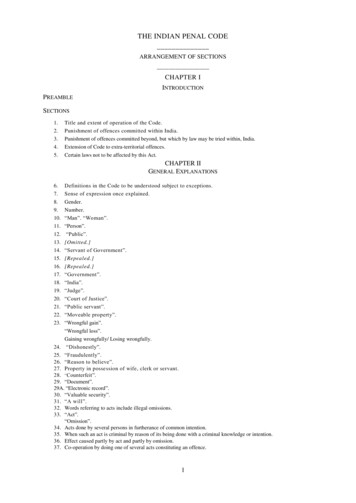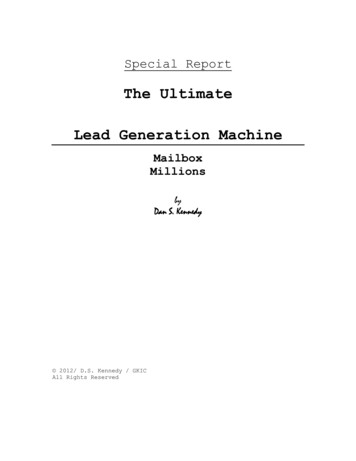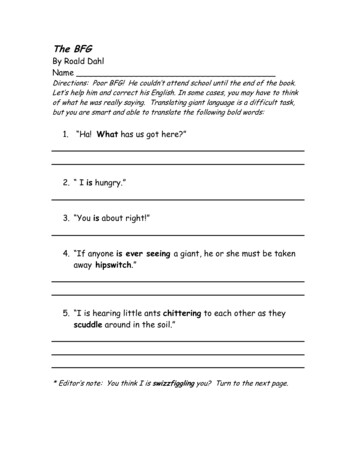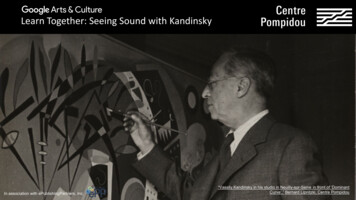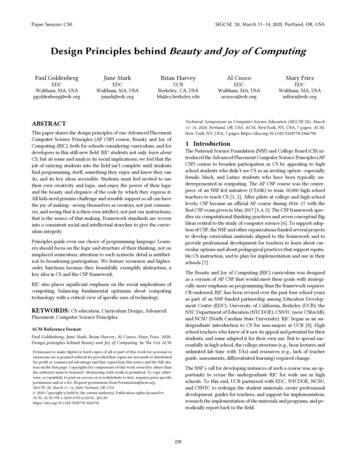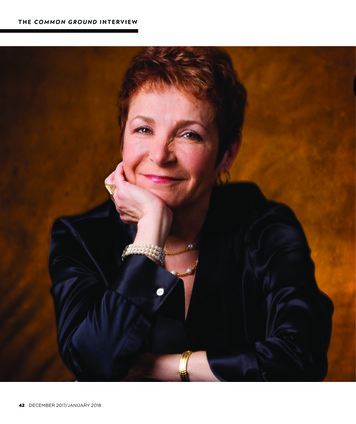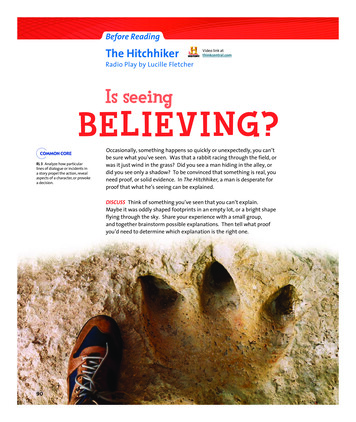
Transcription
Before ReadingThe HitchhikerVideo link atthinkcentral.comRadio Play by Lucille FletcherIs seeingBELIEVING?RL 3 Analyze how particularlines of dialogue or incidents ina story propel the action, revealaspects of a character, or provokea decision.Occasionally, something happens so quickly or unexpectedly, you can’tbe sure what you’ve seen. Was that a rabbit racing through the field, orwas it just wind in the grass? Did you see a man hiding in the alley, ordid you see only a shadow? To be convinced that something is real, youneed proof, or solid evidence. In The Hitchhiker, a man is desperate forproof that what he’s seeing can be explained.DISCUSS Think of something you’ve seen that you can’t explain.Maybe it was oddly shaped footprints in an empty lot, or a bright shapeflying through the sky. Share your experience with a small group,and together brainstorm possible explanations. Then tell what proofyou’d need to determine which explanation is the right one.90090-091 NA L08PE-u01s05-brHit.indd 9012/25/10 3:50:53 AM
Meet the Authortext analysis: foreshadowingWhen a writer provides hints that suggest future events in astory, the writer is foreshadowing. For example, if a charactersays, “Whatever you do, don’t open that door,” you mightsuspect that the door will eventually be opened to create adramatic effect. Anticipating that event can add to the story’ssuspense, making you more excited to find out what happensnext.As you read The Hitchhiker, make a chart to note events ordialogue that might foreshadow what happens later. You’llcomplete the chart at the end of the selection.ForeshadowingEvents That Were ForeshadowedLucille Fletcher1912–2000Suspenseful StoriesAs a young adult, Lucille Fletcher wantedto become a novelist. After she took herfirst job as a script typist and began readingscripts by other writers, she decided shewanted to write plays as well. She wassuccessful at both. Fletcher penned morethan 20 radio plays, including the wellknown Sorry, Wrong Number and TheHitchhiker. In addition, she wrote severalnovels. Her works were suspenseful, full ofmystery, and often terrifying.background to the playreading strategy: reading a radio playA radio play is a play written for radio broadcast, which meansthat it is primarily meant to be heard, not seen. Since listenerscan’t see the actors, radio playwrights give information about thecharacters through Dialogue, or the words spoken by the actors Stage directions, which include instructions to the actorsabout how dialogue should be spoken and instructions to thecrew about sounds effectsAs you read The Hitchhiker, notice what these elements suggestabout the personality and state of mind of the protagonist,or main character. Also notice what these elements suggestabout the appearance and actions of the antagonist, or the forceworking against the main character.vocabulary in contextRadio PlaysThough the television was invented in the1920s, most American households did nothave television sets until the late 1950s.Before then, families gathered aroundthe radio to listen to their favorite radioplays. These plays took the form of dramas,mysteries, or comedies. Actors at the radiostation read their lines into the microphonewith dramatic flair. Background musichelped set the mood.Hearing Is BelievingSound effects were an important part of aradio play. They were often produced in theradio studio. Sheet metal, shaken up anddown, replicated rolling thunder. A woodenmatch, broken close to the microphone,sounded like a baseball bat striking a ball.Coconut halves clapped against woodimitated the sound of horses’ hooves.The words in Column A help Lucille Fletcher tell about one man’sencounter with a mysterious hitchhiker. Match each word withthe word or phrase in Column B that is closest in meaning.Column AColumn B1. larka. guarantee2. junctionb. carefree adventure3. sinisterc. evil4. assuranced. sameness5. monotonye. place of joiningAuthorOnlineGo to thinkcentral.com.KEYWORD: HML8-91Complete the activities in your Reader/Writer Notebook.91090-091 NA L08PE-u01s05-brHit.indd 9112/25/10 3:51:03 AM
Lucille FletcherCAST OF CHARACTERSGirlOperatorLong-Distance OperatorAlbuquerque OperatorNew York OperatorMrs. WhitneyOrson WellesRonald AdamsAdams’s MotherVoice of HitchhikerMechanicHenry, a sleepy manWoman’s Voice, Henry’s wifeWelles. Good evening, this is Orson Welles . . .10(music in) Personally I’ve never met anybodywho didn’t like a good ghost story, but I know alot of people who think there are a lot of peoplewho don’t like a good ghost story. For the benefitof these, at least, I go on record at the outsetof this evening’s entertainment with the soberassurance that although blood may be curdledon this program none will be spilt. There’s noshooting, knifing, throttling, axing or poisoninghere. No clanking chains, no cobwebs, no bonyand/or hairy hands appearing from secret panelsor, better yet, bedroom curtains. If it’s any part20of that dear old phosphorescent1 foolishness thatpeople who don’t like ghost stories don’t like,then again I promise you we haven’t got it. Whatwe do have is a thriller. If it’s half as good aswe think it is you can call it a shocker, and wepresent it proudly and without apologies. Afterall a story doesn’t have to appeal to the heart—it can also appeal to the spine. Sometimes youwant your heart to be warmed—sometimes youwant your spine to tingle. The tingling, it’s to behoped, will be quite audible as you listen tonightto The Hitchhiker—That’s the name of our story,The Hitchhiker—1. phosphorescent (fJsQfE-rDsPEnt): glowing with a cold light.92unit 1: plot and conflict092-101 NA L08PE-u01s05-Hitch.indd 9212/25/10 3:51:23 AM
photo of 1940 ford v8or close-up shot of car’s tires asthey lead off into the distance092-101 NA L08PE-u01s05-Hitch.indd 9312/25/10 3:51:31 AM
3040506094(sound: automobile wheels humming over concreteroad )(music: something weird and shuddery)Adams. I am in an auto camp on Route Sixtysix just west of Gallup, New Mexico. If I tell itperhaps it will help me. It will keep me fromgoing mad. But I must tell this quickly. I am notmad now. I feel perfectly well, except that I amrunning a slight temperature. My name is RonaldAdams. I am thirty-six years of age, unmarried,tall, dark, with a black mustache. I drive a 1940Ford V-8, license number 6V-7989. I was bornin Brooklyn. All this I know. I know that I am atthis moment perfectly sane. That it is not I, whohas gone mad—but something else—somethingutterly beyond my control. But I must speakquickly. At any moment the link with life maybreak. This may be the last thing I ever tell onearth . . . the last night I ever see the stars. . . .(music in)Adams. Six days ago I left Brooklyn, to drive toCalifornia . . .Mother. Goodbye, son. Good luck to you, myboy . . .Adams. Goodbye, mother. Here—give me a kiss,and then I’ll go . . .Mother. I’ll come out with you to the car.Adams. No. It’s raining. Stay here at the door.Hey—what is this? Tears? I thought you promisedme you wouldn’t cry.Mother. I know dear. I’m sorry. But I—do hate tosee you go.Adams. I’ll be back. I’ll only be on the coast threemonths.Mother. Oh—it isn’t that. It’s just—the trip.Ronald—I wish you weren’t driving.Adams. Oh—mother. There you go again. Peopledo it every day.7080Mother. I know. But you’ll be careful, won’t you.Promise me you’ll be extra careful. Don’t fallasleep—or drive fast—or pick up any strangers onthe road . . .Adams. Of course not! You’d think I was stillseventeen to hear you talk—Mother. And wire me as soon as you get toHollywood, won’t you, son?Adams. Of course I will. Now don’t you worry.There isn’t anything going to happen. It’s justeight days of perfectly simple driving on smooth,decent, civilized roads, with a hotdog or ahamburger stand every ten miles . . . (fade)(sound: auto hum)(music in)Adams. I was in excellent spirits. The drive aheadof me, even the loneliness, seemed like a lark. ButI reckoned without him.(Music changes to something weird and empty.)unit 1: plot and conflict092-101 NA L08PE-u01s05-Hitch.indd 9412/25/10 3:51:36 AM
90100110120Adams. Crossing Brooklyn Bridge that morningin the rain, I saw a man leaning against thecables. He seemed to be waiting for a lift. Therewere spots of fresh rain on his shoulders. He wascarrying a cheap overnight bag in one hand. Hewas thin, nondescript, with a cap pulled downover his eyes. He stepped off the walk, and if Ihadn’t swerved, I’d have hit him.(sound: terrific skidding)(music in)Adams. I would have forgotten him completely,except that just an hour later, while crossing thePulaski Skyway over the Jersey flats, I saw himagain. At least, he looked like the same person.He was standing now, with one thumb pointingwest. I couldn’t figure out how he’d got there, butI thought probably one of those fast trucks hadpicked him up, beaten me to the Skyway, and lethim off. I didn’t stop for him. Then—late thatnight, I saw him again.(music changing)Adams. It was on the new Pennsylvania Turnpike between Harrisburg and Pittsburgh. It’s 265miles long, with a very high speed limit. I was justslowing down for one of the tunnels—when I sawhim—standing under an arc light by the side ofthe road. I could see him quite distinctly. The bag,the cap, even the spots of fresh rain spattered overhis shoulders. He hailed me this time . . .Voice (very spooky and faint). Hall-ooo . . . (echo asthrough tunnel ) Hall-ooo . . . !Adams. I stepped on the gas like a shot. That’slonely country through the Alleghenies,2 andI had no intention of stopping. Besides, thecoincidence, or whatever it was, gave me thewillies.3 I stopped at the next gas station.(sound: auto tires screeching to stop . . . horn honk)Mechanic. Yes, sir.Adams. Fill her up.Mechanic. Certainly, sir. Check your oil, sir?Adams. No, thanks.130140150160(sound: gas being put into car . . . bell tinkle, etcetera)Mechanic. Nice night, isn’t it?Adams. Yes. It—hasn’t been raining here recently,has it?Mechanic. Not a drop of rain all week.Adams. Hm. I suppose that hasn’t done yourbusiness any harm.Mechanic. Oh—people drive through here allkinds of weather. Mostly business, you know.There aren’t many pleasure cars out on theturnpike this season of the year.Adams. I suppose not. (casually) What abouthitchhikers?Mechanic (half laughing). Hitchhikers here?Adams. What’s the matter? Don’t you ever see any?Mechanic. Not much. If we did, it’d be a sight forsore eyes.Adams. Why?Mechanic. A guy’d be a fool who started out tohitch rides on this road. Look at it. It’s 265 mileslong, there’s practically no speed limit, and it’s astraightaway. Now what car is going to stop topick up a guy under those conditions? Wouldyou stop?Adams. No. (slowly, with puzzled emphasis) Thenyou’ve never seen anybody?Mechanic. Nope. Mebbe they get the lift before theturnpike starts—I mean, you know—just beforethe toll house—but then it’d be a mighty long ride.Most cars wouldn’t want to pick up a guy for thatlong a ride. And you know—this is pretty lonesomecountry here—mountains, and woods . . . You ain’tseen anybody like that, have you?Adams. No. (quickly) Oh no, not at all. It was—just a—technical question.2. Alleghenies (BlQG-gAPnCz): The Allegheny Mountains, a range extending from northern Pennsylvania towestern Virginia.3. gave me the willies: made me nervous.the hitchhiker092-101 NA L08PE-u01s05-Hitch.indd 959512/25/10 3:51:37 AM
Mechanic. I see. Well—that’ll be just a dollar17018019020096forty-nine—with the tax . . . (fade)(sound: auto hum up)(music changing)Adams. The thing gradually passed from mymind, as sheer coincidence. I had a good night’ssleep in Pittsburgh. I did not think about theman all next day—until just outside of Zanesville,Ohio, I saw him again.(music: dark, ominous note)Adams. It was a bright sunshiny afternoon. Thepeaceful Ohio fields, brown with the autumnstubble, lay dreaming in the golden light. I wasdriving slowly, drinking it in, when the roadsuddenly ended in a detour. In front of the barrier,he was standing.(music in)Adams. Let me explain about his appearance beforeI go on. I repeat. There was nothing sinister abouthim. He was as drab as a mud fence. Nor was hisattitude menacing. He merely stood there, waiting,almost drooping a little, the cheap overnight bagin his hand. He looked as though he had beenwaiting there for hours. Then he looked up. Hehailed me. He started to walk forward.Voice (far off ). Hall-ooo . . . Hall-ooo . . .Adams. I had stopped the car, of course, for thedetour. And for a few moments, I couldn’t seemto find the new road. I knew he must be thinkingthat I had stopped for him.Voice (closer). Hall-ooo . . . Hallll . . . ooo . . .(sound: gears jamming . . . sound of motor turningover hard . . . nervous accelerator)Voice (closer). Halll . . . oooo . . .Adams (panicky). No. Not just now. Sorry . . .Voice (closer). Going to California?(sound: starter starting . . . gears jamming)Adams (as though sweating blood). No. Not today.The other way. Going to New York. Sorry . . .sorry . . .210220230240(sound: car starts with squeal of wheels on dirt . . .into auto hum)(music in)Adams. After I got the car back onto the roadagain, I felt like a fool. Yet the thought of pickinghim up, of having him sit beside me was somehowunbearable. Yet, at the same time, I felt, morethan ever, unspeakably alone.(sound: auto hum up)Adams. Hour after hour went by. The fields, thetowns ticked off, one by one. The lights changed.I knew now that I was going to see him again.And though I dreaded the sight, I caught myselfsearching the side of the road, waiting for him toappear.(sound: auto hum up . . . car screeches to a halt . . .impatient honk two or three times . . . door beingunbolted)Sleepy Man’s Voice. Yep? What is it? What do youwant?Adams (breathless). You sell sandwiches and pophere, don’t you?Voice (cranky). Yep. We do. In the daytime. Butwe’re closed up now for the night.Adams. I know. But—I was wondering if youcould possibly let me have a cup of coffee—blackcoffee.Voice. Not at this time of night, mister. My wife’sthe cook and she’s in bed. Mebbe further downthe road—at the Honeysuckle Rest . . .(sound: door squeaking on hinges as though beingclosed )Adams. No—no. Don’t shut the door. (shakily)Listen—just a minute ago, there was a manstanding here—right beside this stand—asuspicious looking man . . .Woman’s Voice (from distance). Hen-ry? Who is it,Hen-ry?Henry. It’s nobuddy, mother. Just a feller thinks hewants a cup of coffee. Go back into bed.unit 1: plot and conflict092-101 NA L08PE-u01s05-Hitch.indd 9612/25/10 3:51:38 AM
250260Adams. I don’t mean to disturb you. But you see,I was driving along—when I just happened tolook—and there he was . . .Henry. What was he doing?Adams. Nothing. He ran off—when I stoppedthe car.Henry. Then what of it? That’s nothing to wakea man in the middle of his sleep about. (sternly)Young man, I’ve got a good mind to turn you overto the sheriff.Adams. But—I—Henry. You’ve been taking a nip, that’s what you’vebeen doing. And you haven’t got anything betterto do than to wake decent folk out of their hardearned sleep. Get going. Go on.Adams. But—he looked as though he were goingto rob you.Henry. I ain’t got nothin’ in this stand to lose.Now—on your way before I call out SheriffOakes. (fades)(sound: auto hum up)Adams. I got into the car again and drove onslowly. I was beginning to hate the car. If I couldhave found a place to stop . . . to rest a little. ButI was in the Ozark Mountains of Missouri now.The few resort places there were closed. Only an270280290occasional log cabin, seemingly deserted, brokethe monotony of the wild wooded landscape.I had seen him at that roadside stand; I knew Iwould see him again—perhaps at the next turnof the road. I knew that when I saw him next, Iwould run him down . . .(sound: auto hum up)Adams. But I did not see him again until late nextafternoon . . .(sound: of railroad warning signal at crossroads)Adams. I had stopped the car at a sleepy littlejunction just across the border into Oklahoma—to let a train pass by—when he appeared, acrossthe tracks, leaning against a telephone pole.(sound: distant sound of train chugging . . . bellringing steadily)Adams (very tense). It was a perfectly airless, dryday. The red clay of Oklahoma was baking underthe south-western sun. Yet there were spots offresh rain on his shoulders. I couldn’t stand that.Without thinking, blindly, I started the car acrossthe tracks.(sound: train chugging closer)Adams. He didn’t even look up at me. He wasstaring at the ground. I stepped on the gas hard,veering the wheel sharply toward him. I couldthe hitchhiker092-101 NA L08PE-u01s05-Hitch.indd 979712/25/10 3:51:38 AM
300310320330hear the train in the distance now, but I didn’tcare. Then something went wrong with the car. Itstalled right on the tracks.(sound: Train chugging closer. Above this sound of carstalling.)Adams. The train was coming closer. I could hearits bell ringing, and the cry of its whistle. Stillhe stood there. And now—I knew that he wasbeckoning—beckoning me to my death.(sound: Train chugging close. Whistle blows wildly.Then train rushes up and by with pistons going, etcetera.)Adams. Well—I frustrated him that time. Thestarter had worked at last. I managed to back up.But when the train passed, he was gone. I was allalone in the hot dry afternoon.(sound: Train retreating. Crickets begin to sing.)(music in)Adams. After that, I knew I had to do something.I didn’t know who this man was or what hewanted of me. I only knew that from now on, Imust not let myself be alone on the road for onemoment.(sound: Auto hum up. Slow down. Stop. Dooropening.)Adams. Hello, there. Like a ride?Girl. What do you think? How far you going?Adams. Amarillo . . . I’ll take you to Amarillo.Girl. Amarillo, Texas.Adams. I’ll drive you there.Girl. Gee!(sound: Door closes—car starts.)(music in)Girl. Mind if I take off my shoes? My dogs4 arekilling me.Adams. Go right ahead.Girl. Gee, what a break this is. A swell car, a decentguy, and driving all the way to Amarillo. All Ibeen getting so far is trucks.Adams. Hitchhike much?Girl. Sure. Only it’s tough sometimes, in these340350360370great open spaces, to get the breaks.Adams. I should think it would be. Though I’llbet if you get a good pick-up in a fast car, you canget to places faster than—say, another person, inanother car?Girl. I don’t get you.Adams. Well, take me, for instance. Suppose I’mdriving across the country, say, at a nice steadyclip of about 45 miles an hour. Couldn’t a girllike you, just standing beside the road, waiting forlifts, beat me to town after town—provided shegot picked up every time in a car doing from 65to 70 miles an hour?Girl. I dunno. Maybe she could and maybe shecouldn’t. What difference does it make?Adams. Oh—no difference. It’s just a—crazy ideaI had sitting here in the car.Girl (laughing). Imagine spending your time in aswell car thinking of things like that!Adams. What would you do instead?Girl (admiringly). What would I do? If I was a goodlooking fellow like yourself? Why—I’d just enjoymyself—every minute of the time. I’d sit back, andrelax, and if I saw a good-looking girl along the sideof the road . . . (sharply) Hey! Look out!Adams (breathlessly). Did you see him too?Girl. See who?Adams. That man. Standing beside the barbedwire fence.Girl. I didn’t see—anybody. There wasn’t nothing,but a bunch of steers—and the barbed wire fence.What did you think you was doing? Trying to runinto the barbed wire fence?Adams. There was a man there, I tell you . . . athin gray man, with an overnight bag in his hand.And I was trying to—run him down.Girl. Run him down? You mean—kill him?4. dogs: a slang term for feet.98unit 1: plot and conflict092-101 NA L08PE-u01s05-Hitch.indd 9812/25/10 3:51:39 AM
380390400Adams. He’s a sort of—phantom. I’m trying toget rid of him—or else prove that he’s real. But(desperately) you say you didn’t see him back there?You’re sure?Girl. I didn’t see a soul. And as far as that’sconcerned, mister . . .Adams. Watch for him the next time, then. Keepwatching. Keep your eyes peeled on the road.He’ll turn up again—maybe any minute now.(excitedly) There. Look there—(sound: Auto sharply veering and skidding. Girlscreams.)(sound: Crash of car going into barbed wire fence.Frightened lowing5 of steer.)Girl. How does this door work? I—I’m gettin’outta here.Adams. Did you see him that time?Girl (sharply). No. I didn’t see him that time. Andpersonally, mister, I don’t expect never to see him.All I want to do is to go on living—and I don’t seehow I will very long driving with you—Adams. I’m sorry. I—I don’t know what came overme. (frightened) Please—don’t go . . .Girl. So if you’ll excuse me, mister—Adams. You can’t go. Listen, how would you liketo go to California? I’ll drive you to California.Girl. Seeing pink elephants all the way? No thanks.Adams (desperately). I could get you a job there.You wouldn’t have to be a waitress. I have friendsthere—my name is Ronald Adams—You cancheck up.(sound: door opening)Girl. Uhn-hunh. Thanks just the same.Adams. Listen. Please. For just one minute. Maybeyou think I am half cracked. But this man. Yousee, I’ve been seeing this man all the way acrossthe country. He’s been following me. And if youcould only help me—stay with me—until I reachthe coast—410420430440Girl. You know what I think you need, big boy?Not a girl friend. Just a good dose of sleep. . . .There, I got it now.(sound: door opens . . . slams)Adams. No. You can’t go.Girl (screams). Leave your hands offa me, do youhear! Leave your—Adams. Come back here, please, come back.(sound: struggle . . . slap . . . footsteps running awayon gravel . . . lowing of steer)Adams. She ran from me, as though I were amonster. A few minutes later, I saw a passing truckpick her up. I knew then that I was utterly alone.(sound: lowing of steer up)Adams. I was in the heart of the great Texasprairies. There wasn’t a car on the road after thetruck went by. I tried to figure out what to do,how to get hold of myself. If I could find a placeto rest. Or even, if I could sleep right here in thecar for a few hours, along the side of the road . . .I was getting my winter overcoat out of the backseat to use as a blanket, (Hall-ooo) when I sawhim coming toward me, (Hall-ooo), emergingfrom the herd of moving steer . . .Voice. Hall-ooo . . . Hall-oooo . . .(sound: auto starting violently . . . up to steady hum)(music in)Adams. I didn’t wait for him to come any closer.Perhaps I should have spoken to him then,fought it out then and there. For now he beganto be everywhere. Whenever I stopped, even fora moment—for gas, for oil, for a drink of pop, acup of coffee, a sandwich—he was there.(music faster)Adams. I saw him standing outside the auto campin Amarillo that night, when I dared to slowdown. He was sitting near the drinking fountainin a little camping spot just inside the border ofNew Mexico.5. lowing: mooing.the hitchhiker092-101 NA L08PE-u01s05-Hitch.indd 999912/25/10 3:51:39 AM
450460(music faster)Adams. He was waiting for me outside the NavajoReservation, where I stopped to check my tires.I saw him in Albuquerque6 where I bought 12gallons of gas . . . I was afraid now, afraid to stop.I began to drive faster and faster. I was in lunarlandscape now—the great arid mesa countryof New Mexico. I drove through it with theindifference of a fly crawling over the face of themoon.(music faster)Adams. But now he didn’t even wait for me tostop. Unless I drove at 85 miles an hour overthose endless roads—he waited for me at everyother mile. I would see his figure, shadowless,flitting before me, still in its same attitude,over the cold and lifeless ground, flitting overdried-up rivers, over broken stones cast up byold glacial upheavals, flitting in the pure andcloudless air . . .470480(music strikes sinister note of finality.)Adams. I was beside myself when I finally reachedGallup, New Mexico, this morning. There is anauto camp here—cold, almost deserted at thistime of year. I went inside, and asked if there wasa telephone. I had the feeling that if only I couldspeak to someone familiar, someone that I loved,I could pull myself together.(sound: nickel put in slot)Operator. Number, please?Adams. Long distance.Operator. Thank you.(sound: return of nickel; buzz)Long-Distance Opr. This is long distance.Adams. I’d like to put in a call to my home inBrooklyn, New York. I’m Ronald Adams. Thenumber is Beechwood 2-0828.Long-Distance Opr. Thank you. What is yournumber?6. Albuquerque (BlPbE-kûrQkC): a city in central New Mexico.100unit 1: plot and conflict092-101 NA L08PE-u01s05-Hitch.indd 10012/25/10 3:51:39 AM
Adams. 312.490500510520Mrs. Whitney. Yes.Albuquerque Opr. Albuquerque.Adams. Where’s my mother? Where’s Mrs.Long-Distance Opr. New York for Gallup. (pause)Adams?New York Opr. New York.Mrs. Whitney. Mrs. Adams is not at home. She isstill in the hospital.Adams. The hospital!Mrs. Whitney. Yes. Who is this calling, please? Is ita member of the family?Adams. What’s she in the hospital for?Mrs. Whitney. She’s been prostrated7 for five days.Nervous breakdown. But who is this calling?Adams. Nervous breakdown? But—my motherwas never nervous . . .Mrs. Whitney. It’s all taken place since the death ofher oldest son, Ronald.Adams. Death of her oldest son, Ronald . . . ?Hey—what is this? What number is this?Mrs. Whitney. This is Beechwood 2-0828. It’s allbeen very sudden. He was killed just six days ago inan automobile accident on the Brooklyn Bridge.Long-Distance Opr. (breaking in). Your threeminutes are up, sir. (silence) Your three minutesare up, sir. (pause) Your three minutes are up, sir.(fade) Sir, your three minutes are up. Your threeminutes are up, sir.Adams (in a strange voice). And so, I am sittinghere in this deserted auto camp in Gallup, NewMexico. I am trying to think. I am trying to gethold of myself. Otherwise, I shall go mad . . .Outside it is night—the vast, soulless night ofNew Mexico. A million stars are in the sky. Aheadof me stretch a thousand miles of empty mesa,mountains, prairies—desert. Somewhere amongthem, he is waiting for me. Somewhere I shallknow who he is, and who . . . I . . . am . . .(music up)Long-Distance Opr. Gallup, New Mexico callingBeechwood 2-0828. (fade)Adams. I had read somewhere that love couldbanish demons. It was the middle of the morning.I knew Mother would be home. I pictured her,tall, white-haired, in her crisp house-dress, goingabout her tasks. It would be enough, I thought,merely to hear the even calmness of her voice . . .Long-Distance Opr. Will you please deposit threedollars and 85 cents for the first three minutes?When you have deposited a dollar and a half, willyou wait until I have collected the money?(sound: clunk of six coins)Long-Distance Opr. All right, deposit anotherdollar and a half.(sound: clunk of six coins)Long-Distance Opr. Will you please deposit theremaining 85 cents.(sound: clunk of four coins)Long-Distance Opr. Ready with Brooklyn—goahead please.Adams. Hello.Mrs. Whitney. Mrs. Adams’ residence.Adams. Hello. Hello—Mother?Mrs. Whitney (very flat and rather proper . . . dumb,too, in a frizzy sort of way). This is Mrs. Adams’residence. Who is it you wished to speak to, please?Adams. Why—who’s this?Mrs. Whitney. This is Mrs. Whitney.Adams. Mrs. Whitney? I don’t know any Mrs.Whitney. Is this Beechwood 2-0828?5305405507. prostrated: in a state of mental collapse.the hitchhiker092-101 NA L08PE-u01s05-Hitch.indd 10110112/25/10 3:51:46 AM
After ReadingComprehension1. Recall What is Ronald Adams’s original destination?2. Clarify Why does the repeated sight of the hitchhiker give Adams“the willies”?3. Clarify What does Adams learn about his mother at the end of the play?RL 3 Analyze how particular linesof dialogue or incidents in a storypropel the action, reveal aspects ofa character, or provoke a decision.RL 5 Compare and contrast thestructure of two or more texts.Text Analysis4. Make Inferences What kind of relationship did Ronald Adams have withhis mother? Cite evidence to support your answer.5. Examine Foreshadowing Now that you’ve read the play, is there anythingyou’d like to change or add to the first column of your foreshadowing chart?Make the adjustments and complete the second column. Which use offoreshadowing most increased your sense of suspense?6. Analyze the Radio Play Reread lines 171–208. What do the stage directionsand dialogue tell you about the hitchhiker’s appearance and actions? Whatdo these elements tell you about Adams’ feelings and actions? Cite specificdetails in your answer.7. Draw Conclusions Who do you think the hitchhiker is? Give proof fromthe play to support your conclusion.8. Compare Across Texts What are some similarities anddifferences between the characters, settings, and structuresof “The Tell-Tale Heart” and The Hitchhiker? Present youranswers in a Venn diagram.“The Tell-Tale Heart” The HitchhikerExtension and Challenge9. Creative Project: Drama With a small group, choose a scenefrom The Hitchhiker that you think is especially suspenseful.Practice performing the scene, remembering to include sound effects and tofollow stage directions. Then perform for the class. Afterward, explain whyyour group chose the scene you did.Is seeing BELIEVING?If you were Adam, would you have believed your eyes, or trusted that thehitchhiker you kept seeing was real? Explain.102unit 1: plot and conflict102-103 NA L08PE-u01s05-arHit.indd 10212/25/10 3:52:12 AM
Languagegrammar in context: Maintain Pronoun Antecedent AgreementAn antecedent is the noun or pronoun to which a pronoun refers. For example,in the following sentence, the pronoun their refers to the antecedent they:They took their seats at the café. Be sure to use singular pronouns with singularantecedents and plural pronouns with plural antecedents. Pair antecedentsending in one, thing, or body with singular pronouns, such as he, her, she, or his.In the revised sentence, notice how the pronouns (in
the radio to listen to their favorite radio plays. These plays took the form of dramas, mysteries, or comedies. Actors at the radio station read their lines into the microphone with dramatic flair. Background music helped set the mood. Hearing Is Believing Sound effects were an import
